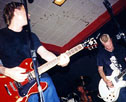
Comment
on this story
Who:
Ann Beretta with Atropos and Kid Snack
When:
Thursday, March 22 at 9 p.m.
Where:
The Pilot Light
How Much:$6 cover
|
|

Ann Beretta lives the 9-to-5 life
by John Sewell
The working class hero is a long-time archetype in the pantheon of rock 'n' roll iconography. From the primordial days of Elvis Presley to blue collar rockers such as Bruce Springsteen and John Mellencamp, there has always been a contingent of musicians realizing their peak popularity among the rank and file of Middle America.
Punk is really a microcosm of the larger rock 'n' roll world and has its own hierarchy of heroes: art rockers, poets, gender benders, philosophers, aesthetes, tough guys, riot grrrls and romantically wasted suicides-in-progress. Though punk rock is largely a middle class phenomenon, it has had its share of blue collar rebels as well. The working class presence has made a deep impression in punk history from day one, starting with The Clash and continuing its progress through diverse artists such as Billy Bragg, Stiff Little Fingers, The Swinging Udders, Rancid and a host of street-punk/oi bands worldwide.
Richmond, Virginia's Ann Beretta has perpetuated the ideals of working class rock from within the punk context. And more importantly, their blue collar aesthetic is not just a pose. Since the band's inception in the mid-'90s, it has been a constant (and sometimes losing) battle to stay in the black. And when the band is not touring, members will most assuredly be clocking in on the 9-to-5 treadmill.
"I do have a steady job because that's just something I want to do—to work a normal job and live a regular life when I'm not touring," says guitarist/vocalist Robbie Huddleston. "I want to be a normal everyday Joe who gets up at seven, does eight hours and comes home tired." But Huddleston's job as a sign carpenter is more than just a greenhouse for his muse—bills pile up while the band is on the road and a steady income must be maintained in order to stay afloat financially.
Now that the band is firmly established in the underground scene, things are getting a little bit better financially. "I mean, when we come home from a tour we have a little money to split up so it's not like we're in a desperate kind of situation these days," says Huddleston. "But we live very modestly and it's not like we're buying a bunch of fancy clothes or living some rock 'n' roll lifestyle."
The publicity campaign for the upcoming Ann Beretta album, New Union...Old Glory (Lookout Records), is chock full of working class pop culture references. And Huddleston says that though this might be a new angle for his publicists, his blue collar life and reverence for traditional American music is the real thing.
"That's always been there from the get-go, especially for me personally," says Huddleston. "I mean, I've always been really into all kinds of acoustic-based, grassroots music. And those guys: Springsteen and Mellencamp—they've always been as punk rock as Social Distortion or the Sex Pistols or whatever. It's the same three chords, it's just not quite as distorted maybe. It's the same ideas of a working class revolution, it's just that the volume might be a little lower."
But the working class, street-punk classification can also usher in some negatives. There is a subtext of nationalism in much of the street-punk canon, not to mention the scourge of thuggish behavior, macho tendencies and gang mentality that is often part and parcel of the street-punk scene.
"There's kind of a fine line there," says Huddleston. "We've played to some of these kind of oi crowds and skinhead crowds, and I am a little wary of that—mainly because of the way they react: the fist throwing and the attitude behind some of the roughness. That's really not what we want to see. But it's hard to make the judgment sometimes, especially up north. It's hard to determine what is socially acceptable in different scenes. Maybe the crowd is showing their appreciation or maybe it's just a handful of guys roughing everybody up."
One way to quell the ritualized faux-violence of a punk rock show is to suffuse the set with a few acoustic numbers. This is not really an audience control tactic, but more of a chance for Huddleston to stretch the emotional spectrum of his song writing. With the acoustic material (the band has released an E.P. of all acoustic songs), Huddleston mirrors the artistry of Johnny Cash or Steve Earle, all within the punk context. And surprisingly enough, audiences are very receptive to the band's rough-hewn, quieter side.
"That's one reason why I'm so excited and really almost hell-bent about bringing other things into the punk rock avenue," says Huddleston. "I mean, like with our acoustic stuff—that's something I'd never heard of before. I think punk rock and folk music really go hand in hand, it's just a matter of whether or not you have distortion and a full band behind what you're saying.
"I've always, from the very beginning of this band, wanted to do things that nobody expected us to do. It really excites me to know that the people that like our band like us enough to accept the things about us that not every punk band is gonna do. I think it's really kind of cool that we're the type of band that has an audience that can adapt. They're receptive to both sides and that's great."
Editor's Note: John Sewell is both a writer and a musician, which, we think, makes him uniquely qualified to comment on music. His band, Kid Snack, will open for Ann Beretta.

March 15, 2001 * Vol. 11, No. 11
© 2001 Metro Pulse
|





